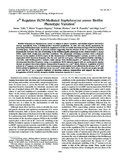Mostrar el registro sencillo del ítem
B regulates IS256-mediated Staphylococcus aureus biofilm phenotypic variation
| dc.creator | Valle Turrillas, Jaione | es_ES |
| dc.creator | Vergara Irigaray, Marta | es_ES |
| dc.creator | Merino, Nekane | es_ES |
| dc.creator | Penadés, José R. | es_ES |
| dc.creator | Lasa Uzcudun, Íñigo | es_ES |
| dc.date.accessioned | 2019-01-23T11:16:23Z | |
| dc.date.available | 2019-01-23T11:16:23Z | |
| dc.date.issued | 2007 | |
| dc.identifier.issn | 0021-9193(Print) | |
| dc.identifier.issn | 1098-5530 (Electronic) | |
| dc.identifier.uri | https://hdl.handle.net/2454/32089 | |
| dc.description.abstract | Biofilm formation in Staphylococcus aureus is subject to phase variation, and biofilm-negative derivatives emerge sporadically from a biofilm-positive bacterial population. To date, the only known mechanism for generating biofilm phenotypic variation in staphylococci is the reversible insertion/excision of IS256 in biofilm-essential genes. In this study, we present evidence suggesting that the absence of the σB transcription factor dramatically increases the rate of switching to the biofilm-negative phenotype in the clinical isolate S. aureus 15981, under both steady-state and flow conditions. The phenotypic switching correlates with a dramatic increase in the number of IS256 copies in the chromosomes of biofilm-negative variants, as well as with an augmented IS256 insertion frequency into the icaC and the sarA genes. IS256-mediated biofilm switching is reversible, and biofilm-positive variants could emerge from biofilm-negative σB mutants. Analysis of the chromosomal insertion frequency using a recombinant IS256 element tagged with an erythromycin marker showed an almost three-times-higher transposition frequency in a ΔσB strain. However, regulation of IS256 activity by σB appears to be indirect, since transposase transcription is not affected in the absence of σB and IS256 activity is inhibited to wild-type levels in a ΔσB strain under NaCl stress. Overall, our results identify a new role for σB as a negative regulator of insertion sequence transposition and support the idea that deregulation of IS256 activity abrogates biofilm formation capacity in S. aureus. | en |
| dc.description.sponsorship | Marta Vergara-Irigaray is a predoctoral fellow (FPU) from the Ministerio de Educación y Ciencia, Spain. Nekane Merino is a predoctoral fellow from the Basque Government, Spain. This work was supported by the BIO2005-08399 grant from the Spanish Ministerio de Educación y Ciencia and grant LSHM-CT-2006-019064 from the European Union. | en |
| dc.format.extent | 11 p. | |
| dc.format.mimetype | application/pdf | en |
| dc.language.iso | eng | en |
| dc.publisher | American Society for Microbiology | en |
| dc.relation.ispartof | Journal of Bacteriology, vol. 189, nº 7, apr. 2007, p. 2886–2896 | en |
| dc.rights | © 2007, American Society for Microbiology. All Rights Reserved. | en |
| dc.subject | Biofilm phenotypic variation | en |
| dc.title | B regulates IS256-mediated Staphylococcus aureus biofilm phenotypic variation | en |
| dc.type | info:eu-repo/semantics/article | en |
| dc.type | Artículo / Artikulua | es |
| dc.contributor.department | Producción Agraria | es_ES |
| dc.contributor.department | Nekazaritza Ekoizpena | eu |
| dc.contributor.department | IdAB. Instituto de Agrobiotecnología / Agrobioteknologiako Institutua | es |
| dc.rights.accessRights | info:eu-repo/semantics/openAccess | en |
| dc.rights.accessRights | Acceso abierto / Sarbide irekia | es |
| dc.identifier.doi | 10.1128/jb.01767-06 | |
| dc.relation.publisherversion | https://doi.org/10.1128/jb.01767-06 | |
| dc.type.version | info:eu-repo/semantics/publishedVersion | en |
| dc.type.version | Versión publicada / Argitaratu den bertsioa | es |


